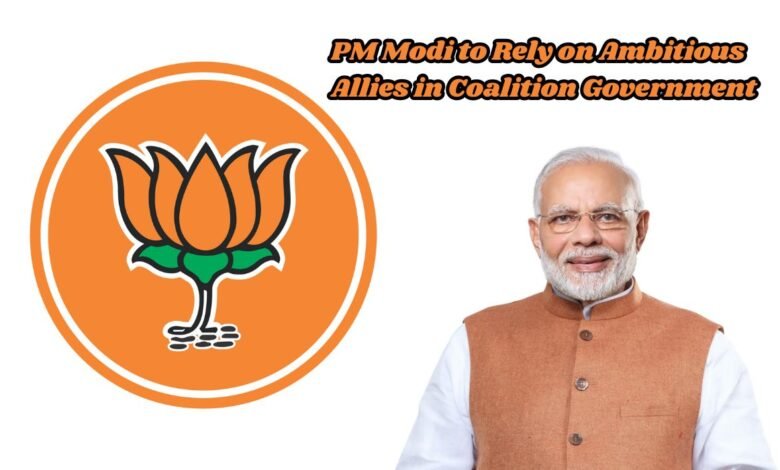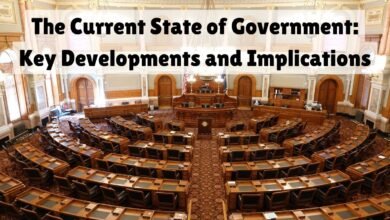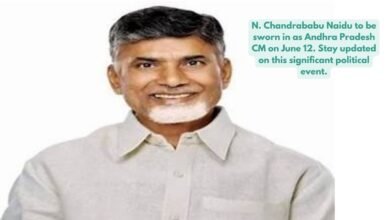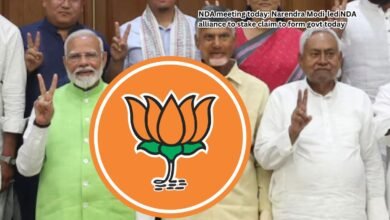PM Modi to Rely on Ambitious Allies in Coalition Government
Prime Minister Modi seeks support from ambitious allies in forming a coalition government, shaping India's political landscape.

A coalition government emerges when multiple political parties join forces to form a government, usually because no single party has achieved a clear majority in the legislature. In the context of Indian politics, coalition governments have become a significant feature due to the country’s diverse and multi-party system. These alliances are crucial as they allow for broader representation and the inclusion of varied political perspectives, which can lead to more balanced governance.
In India, coalition governments have often been a necessity rather than a choice. The Indian National Congress and the Bharatiya Janata Party (BJP) have both led coalition governments at different times, highlighting the importance of strategic alliances. The necessity of coalition governments in India is driven by the regional diversity and the presence of strong state-level parties, which often hold considerable sway in their respective regions. These parties can influence national politics by aligning with larger parties to form a government.
Coalition governments function through a system of negotiated agreements and shared responsibilities. The leading party, typically the one with the most seats, partners with smaller parties to secure the majority required to govern. These alliances are founded on mutual interests and often involve compromises on policy and governance strategies. Effective coalition governance requires adept negotiation skills and a willingness to accommodate the aspirations of various partners.
Historically, India has seen numerous coalition governments, especially since the late 1980s. The era of single-party dominance faded, giving rise to coalition politics. This shift was marked by the increased influence of regional parties and the need for national parties to collaborate with them. The coalition government model has proven to be both a challenge and an opportunity, fostering a more inclusive political environment.
In the contemporary political landscape, Prime Minister Narendra Modi’s reliance on ambitious allies in a coalition government underscores the ongoing relevance of this governance model. As India continues to navigate its complex political terrain, coalition governments remain a critical mechanism for achieving stability and effective governance.
PM Modi’s Key Allies and Their Ambitions
In the complex landscape of Indian politics, Prime Minister Narendra Modi relies on a coalition of ambitious allies to steer his government. The Bharatiya Janata Party (BJP), under Modi’s leadership, has formed strategic alliances with several regional parties, each bringing unique strengths and ambitions to the table. These alliances are crucial in maintaining a stable government and advancing Modi’s vision for India.
Here are the key allies and their contributions:
- Shiv Sena: Although historically aligned with the BJP, the Shiv Sena has occasionally shown divergent political ambitions, particularly in Maharashtra. Their strong regional presence and emphasis on Marathi pride often complement the BJP’s broader nationalistic agenda.
- AIDMK: The All India Anna Dravida Munnetra Kazhagam (AIDMK) is a significant player in Tamil Nadu. Their support lends the BJP a foothold in southern India, a region where the party has traditionally struggled to gain traction.
- Janata Dal (United): Led by Nitish Kumar, JD(U) is a crucial ally in Bihar. Nitish Kumar’s developmental agenda and focus on governance resonate with Modi’s vision, making this alliance particularly synergistic.
- Lok Janshakti Party (LJP): Founded by the late Ram Vilas Paswan, the LJP holds sway among the Dalit community. Their alignment with the BJP helps in consolidating a broader voter base, particularly in Bihar.
- Akali Dal: With a strong presence in Punjab, the Akali Dal’s alignment with the BJP helps in addressing the agricultural and Sikh community issues, which are crucial for the region’s stability.
Each of these allies brings distinct political ambitions and regional strengths to the coalition. While some align seamlessly with PM Modi’s vision for a unified and developed India, others occasionally pose challenges due to differing regional priorities. Nevertheless, these alliances are indispensable for navigating the intricacies of Indian politics and achieving collective goals.
Challenges of Managing a Coalition Government
Managing a coalition government presents a complex array of challenges, each requiring careful navigation and strategic foresight. For Prime Minister Modi, the primary difficulty lies in balancing the often conflicting interests of diverse coalition partners. Each ally brings its own set of priorities, which may not always align with the central government’s agenda. These discrepancies can lead to policy disagreements and necessitate constant negotiation and compromise. The intricate process of finding a middle ground often delays decision-making, thereby impacting governance and policy implementation.
One of the most significant challenges arises from the need to maintain a cohesive policy approach. For instance, economic reforms supported by one faction might face staunch opposition from another. Such was the case during the implementation of the Goods and Services Tax (GST) in 2017, where extensive negotiations were required to bring all coalition partners on board. Similarly, social policies, such as the Citizenship Amendment Act, have seen varied responses from different allies, leading to friction within the coalition.
The necessity for constant negotiation can also strain resources and divert attention from pressing governance matters. Coalition partners often demand concessions or specific benefits for their constituencies, which might not always be in line with the broader national interest. This dynamic can lead to a fragmented policy approach, where long-term objectives are sacrificed for short-term political gains.
Historical precedents further illustrate these challenges. The United Progressive Alliance (UPA) government, led by Dr. Manmohan Singh, faced significant hurdles due to coalition dynamics. Policy initiatives like the Nuclear Deal with the United States encountered resistance from within the coalition, necessitating extensive dialogue and compromise.
However, collaboration and communication remain crucial in overcoming these challenges. Building trust among coalition partners, fostering open lines of communication, and engaging in transparent decision-making processes can mitigate conflicts and enhance policy coherence. Effective leadership is, therefore, paramount in steering a coalition government towards stability and progress.
Potential Benefits of a Strong Coalition
A strong coalition government offers numerous potential advantages, particularly in the context of Prime Minister Modi’s leadership and India’s broader governance landscape. One of the primary benefits of such a coalition is the infusion of diverse perspectives into the policy-making process. By bringing together allies from different regions and backgrounds, a coalition can harness a wide array of viewpoints and expertise. This diversity can lead to more comprehensive and inclusive policies that address the needs and concerns of various segments of the population.
Moreover, coalition governments often draw strength from the regional influences and insights of their constituent partners. These regional allies can provide valuable input and advocate for localized interests, ensuring that national policies are more attuned to the specific needs of different areas. This can result in a more balanced approach to governance, where the voices of all regions are heard and considered, fostering a sense of unity and inclusion.
Historical precedents demonstrate the potential for coalition governments to achieve significant milestones. For instance, the United Progressive Alliance (UPA) coalition, which governed India from 2004 to 2014, implemented landmark policies such as the Mahatma Gandhi National Rural Employment Guarantee Act (MGNREGA) and the Right to Information Act. These policies had far-reaching impacts on employment and transparency, showcasing the potential of coalition governments to enact transformative changes.
In the case of PM Modi, reliance on ambitious allies could lead to a more balanced and effective governance model. By collaborating with strong regional leaders and parties, Modi can leverage their strengths to address complex national challenges. This coalition approach can enhance policy implementation and ensure that governance is more representative of India’s diverse population. Ultimately, a robust coalition can foster national unity and drive progress, aligning with the broader goals of inclusive development and equitable growth.



